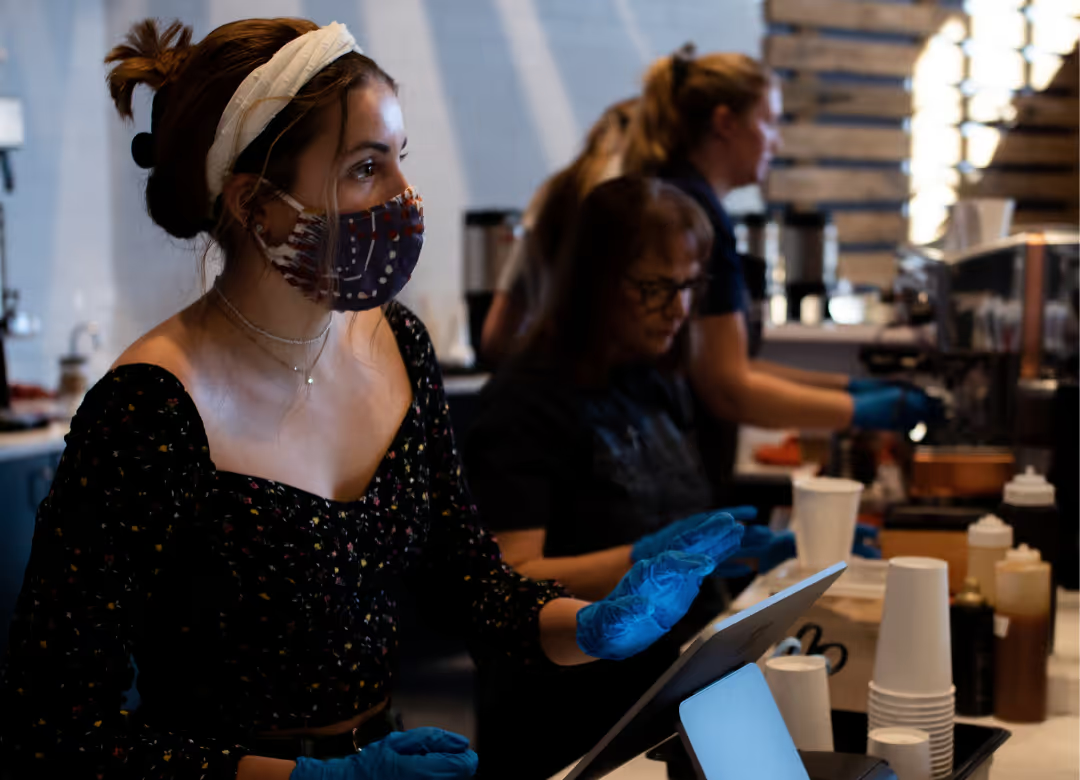Could L&D be the solution to the hospitality industry’s staffing shortage?
The hospitality industry is currently experiencing a shortage of an estimated 200,000 workers - so could L&D be the answer?

The UK hospitality industry is currently experiencing a staffing shortage - and we’re asking the question that’s basically always at the forefront of our minds: Could L&D be the solution?
If you weren’t already aware of this crisis, you might be shocked to find out that a recent survey found the industry is experiencing a shortage of nearly 200,000 workers. That’s enough to fill Glastonbury festival, a well-attended protest, or two large football stadiums.
With business owners having struggled to staff their venues for the ever-hectic summer season, skills requirements rapidly evolving - and therefore skill gaps widening - and a hole in the industry the size of the UK’s biggest festival, the situation is looking bleak.
So, in this blog, we’ll set out to honestly answer whether L&D could be the solution to the issue. But before we do that, let’s establish what might have caused the problem in the first place.

What could be the cause of the hospitality industry’s staffing problem?
As with most issues, there isn’t one single root cause. The problem is complicated, with several factors and moving parts at play - but here are some of the potential reasons:
Public perception of the hospitality industry
Public perception of the hospitality industry could be contributing to the staffing shortage.
Although about half of the industry's workforce is made up of young people aged between 16 - 24, it has recently been found that those same young people are not exactly champing at the bit to work in the sector.
A 2022 study conducted by Umbrella Training found that only one in ten of their respondents (who were all aged between 14 - 21) were willing to consider a career in hospitality.
So, how are their own perceptions informing this?
Despite reports that the average salary for hospitality workers has increased by 53% in the last ten years, Umbrella Training’s study also found that this doesn't align with the public perception of hospitality sector wages. "The pay is not very high" was the most common reason given for not desiring a hospitality career (31%), followed by a lack of knowledge about the industry (26%) a lack of skills (25%) and a perception that hospitality workers are treated poorly (16%.)
The hospitality industry is cyclical in nature
As anyone who has ever had a job in hospitality can attest, the industry is incredibly cyclical and seasonal, with high staff turnover being par for the course. Think about how many times you’d be introduced to a new waiter or bartender just to find out three weeks later that they’d left, or be met with looks of surprise when you told anyone you’d worked a hospitality job for any longer than a year.
With staff hopping between venues like a game of musical chairs, it’s no wonder that there is a lack of staff retention. This can lead to teams being less effective, and training being less consistent as the staff shift and change so rapidly.
Brexit has impacted the workforce
It goes without saying - but we’re going to say it anyway - that Brexit has significantly impacted the UK labour market. With a ‘mass exodus’ (as the Economic Statistics Centre of Excellence is calling it) the UK is experiencing a net loss of 330,000 EU workers as of September 2022. The hospitality sector has been hit especially hard by this exodus, as EU Nationals made up a large percentage of their workforce - over 40% pre-Brexit compared to just 30% post-Brexit.

Ripple effects of COVID
We’re still experiencing the ongoing ripple effects of COVID as they spread - like a virus, you could say - throughout so many different aspects of our lives.
And the hospitality industry is feeling it very acutely.
Following a long period of closed-doors, furloughed staff and job insecurity, many hospitality workers have emerged on the other side of the pandemic with a new perspective on their careers.
It comes back around again to public perception. After COVID has swept through the world and turned everything upside down, people might be feeling hesitant to return to - or start - a career in hospitality. Going back to the Umbrella Training study, a total of 32% of respondents said that their opinion about hospitality has changed since the pandemic.
This could be for a variety of reasons - but health and safety might be the primary concern.
In a customer-facing role, you’re exposed to hundreds of people on a daily basis, and it follows that you’d feel anxious about your risk of exposure to infectious diseases.
On top of this, the pandemic changed remote working from an occasional perk to the new normal - and on the whole, people want more flexibility from their employers. This just isn’t possible with a job that requires you to be in the same place every day - so former hospitality workers can be forgiven for jumping ship.

How L&D could help solve the hospitality industry’s staffing problem
Now that we’ve established why there might be an issue, let’s talk about how L&D might be able to solve it.
Upskilling and advancement opportunities
It’s no big secret - and is really one of the core principles of L&D - that when people feel nurtured and valued, they’re less likely to leave their jobs.
With regular upskilling and opportunities for professional development, food and drink venues are much more likely to retain their existing staff. This saves money that would be allocated to hiring new people by instead investing in those who already work there.
On top of this, investing time and money in Learning and Development leads to staff being more engaged, motivated and aligned with the goals of the business. It’s a win-win.
Attracting new staff
Okay, so you’ve successfully upskilled and retained the people who already work for you… but you do actually need to hire some more staff. It’s summer, people are thirsty, and those pints aren’t going to pour themselves.
But by making career progression and professional development a part of your employer brand, you improve your chances of attracting new talent by making yourself a competitive prospect.
A paycheck and staff discount arguably isn’t really enough any more. The new generation of workers are discerning, hard-working and hungry… (for more than just 25% off burgers.) They’re on the whole willing to offer you those benefits - but you have to offer them benefits in return.
By investing in Learning and Development, you’re outwardly advertising that you really care about your workforce and their professional progression. Not only will this attract new talent, but it’ll increase the job satisfaction of those already working for you.
Addressing skills shortages
Remember the stat we quoted, citing a lack of skills as the third most common reason given for not wanting to join the hospitality industry? Teaching people new skills is kind of L&D’s whole thing.
The skills required for any given sector are always shifting and changing - but by constantly keeping your learning and development strategy updated, you make sure that your people bridge skill gaps and meet your customers’ expectations.
This can also go some way towards resolving the issue we mentioned earlier:
“With staff hopping between venues like a game of musical chairs, it’s no wonder that there is a lack of staff retention. This can lead to teams being less effective, and training being less consistent as the staff shift and change so rapidly.”
If you have a consistent, effective L&D strategy - and a Learning Platform where all your learning is stored in one place - nobody gets left behind.

So, is L&D really the answer to the hospitality industry’s staffing problem?
Well, sort of.
We firmly believe that L&D could go a long way towards addressing the staffing shortage, but we’re not naive enough to suggest that it’s the one and only solution.
Our country has gone through a lot the past few years, and the young people who made up such a large percentage of the industry are no longer so easily bought.
So many mitigating factors need to be addressed - but if you invest time and money in your staff’s professional development, you’re bound to see the difference.
If you’re looking to up your L&D game, upskill your workforce and keep them engaged, Thrive could be perfect for you. Why not book a demo today to see why food and drink giants like Nando’s and Rum Kitchen trust Thrive?

